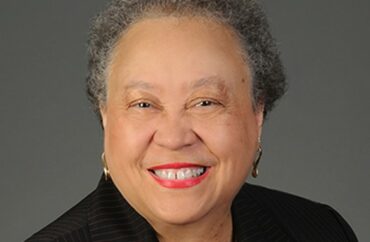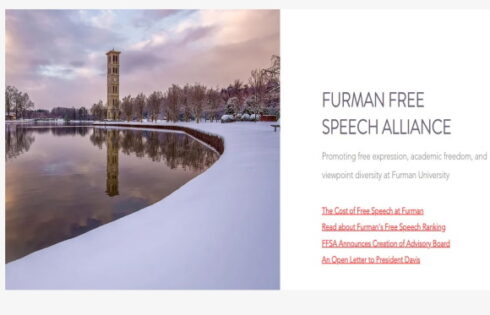
‘DEI approaches can only survive through the aggressive power of the state,’ English professor emeritus said
The major accrediting body of southern and southwestern U.S. colleges and universities declined to vote on a required diversity, equity and inclusion statement at its annual meeting despite the efforts of some college presidents.
Belle Wheelan, president of the Southern Association of Colleges and Schools Commission on Colleges, told The College Fix in an email on Dec. 4 that some expected the delegates to vote on making the position paper’s recommendations required at the end of the session. However, “no motion was put forward,” she wrote Dec. 5.
The accreditor evaluates colleges and universities across 11 states including Virginia, Florida and Texas, according to its website.
Wheelan [pictured] said she was unable to provide names of individual members who wished for or intended to push for a standard. “If I knew, I’d tell you,”she said.
“After Texas passed the rule that took all the DEI funding away, we began to hear from Presidents in Texas, who were disappointed that we didn’t have a standard. If we had had a standard, perhaps they would’ve been able to keep their money,” Wheelan said.
“So, we were hearing the possibility of members from Texas, wanting to change it to a standard on the floor,” Wheelan said. “The board never planned for that so it would have gone back to committee for them to look at the development of a standard.”
Prior to the last day of the convention, Wheelan told The Fix that “We have heard that some remembers are disappointed that we do not have a standard and may make a motion from the floor to do so but it is not being recommended by our Board or the Principles Review Committee.”
The Fix emailed six vice presidents of the SACSCOC Dec. 8 to ask whether they have any information or leads regarding who wanted to put forward the motion to vote and how they could be contacted. It has not received a response.
The association’s Diversity, Equity and Inclusion Position Statement reads, “while there are no specific benchmarks regarding diversity, equity, and inclusion efforts for SACSCOC member institutions, all are encouraged to continue to regularly engage in thoughtful discussions about diversity.”
Such conversations should “intentionally cultivate and sustain inclusive and equitable processes [and] implement strategies to create and maintain respectful and supportive learning environments in which to learn and work.”
The statement puts forth several strategies for “committ[ing] to inclusive institutional environments,” including “dedicating staff to advocate for and lead diversity initiatives,” “offering learning opportunities to explore diversity, and develop a sensitivity to, and an appreciation of, differences,” and “establishing mentoring programs to support students from traditionally underrepresented groups.”
SACSCOC’s 2023 Annual Meeting, which took place in Orlando, Fla., from Dec. 2-5, included multiple sessions about expanding and supporting DEI efforts, as detailed in the program’s 111-page schedule.
The published schedule stated on page 111 that “the session will conclude with a College Delegate Assembly Business Meeting, a report of accreditation and reaffirmation actions taken by the SACSCOC Board of Trustees, and a vote on the slate of SACSCOC Board of Trustees candidates.”
The SACSCOC is the country’s only major accrediting organization without official DEI requirements for the institutions it admits, according to a Dec. 1 article in The Chronicle of Higher Education titled “Accreditor Could Require Diversity Efforts Despite Political Hostility.”
“The other six major accrediting organizations already have standards to hold colleges accountable for how they serve historically underrepresented students,” The Chronicle stated.
“The Southern Association … has taken a more cautious approach than its peer organizations,” according to the news outlet. “Instead of including DEI requirements in its accreditation standards, which apply to all members, they are included in a position statement that expresses the association’s stance on the issue, but is optional for institutions.”
‘It is not a university’s business to develop sensitivity,’ professor said of possible DEI requirements
The Fix spoke with two professors affiliated with southern universities who expressed mixed views over DEI requirements.
Stanley Fish, a professor of law at Florida International University and a recent hire at New College Florida, told Fix over the phone that he is neutral on some of the points but expressed suspicion with the document’s lack of details.
Fish expressed support for the recommendation that universities establish “mentoring programs to support students from traditionally underrepresented groups.”
“Universities may need to ask, ‘what kind of students do we have and what kind of help do they need?'” Fish said.
However, regarding the position statement’s endorsement of “offering learning opportunities to explore diversity, and develop a sensitivity to, and an appreciation of, differences,” Fish said it is “not a university’s business to develop sensitivity.”
However, in general, the statement is “a bit milder than some others I’ve seen, which we should be thankful for,” Fish said.
Mark Bauerlein, professor emeritus of English at Emory University in Atlanta, told The Fix that “DEI practices are squarely contrary to academic freedom.”
“They also erode academic standards,” Bauerlein said.
“This is, in fact, why we see them written into policies and practices, including accreditation,” he said. “DEI approaches can only survive through the aggressive power of the state. If diversity, equity, and inclusion were a normal and fit part of grading, hiring, peer review, and research, they wouldn’t need to be imposed from above.”
MORE: Ohio’s Kent State U. rebrands DEI efforts as lawmakers debate bill to outlaw it
IMAGE: National Institute for Staff and Organizational Development
Like The College Fix on Facebook / Follow us on Twitter





Please join the conversation about our stories on Facebook, Twitter, Instagram, Reddit, MeWe, Rumble, Gab, Minds and Gettr.